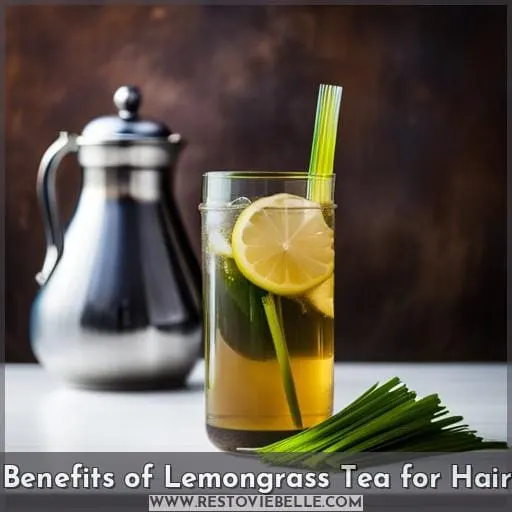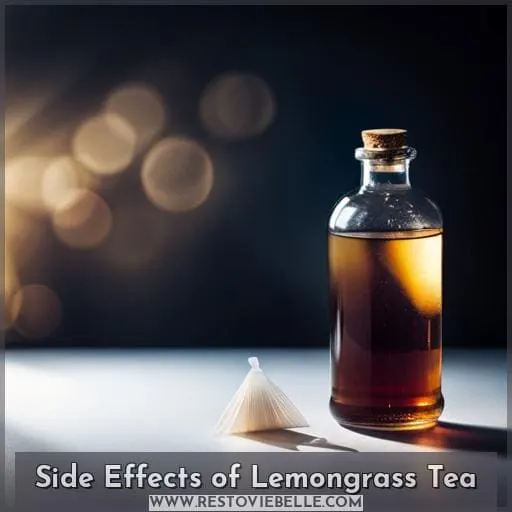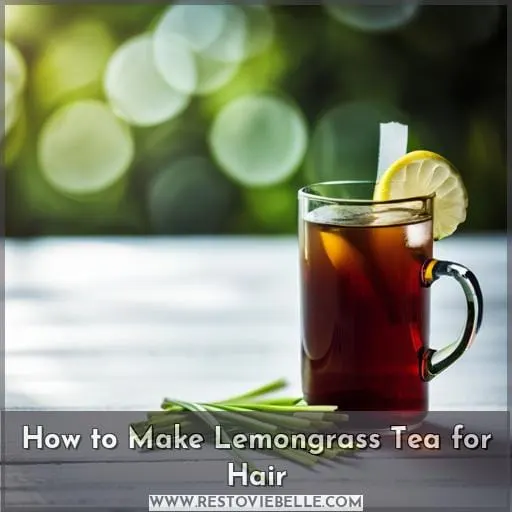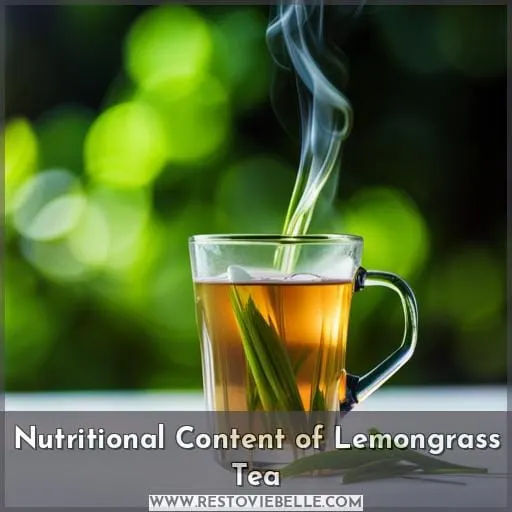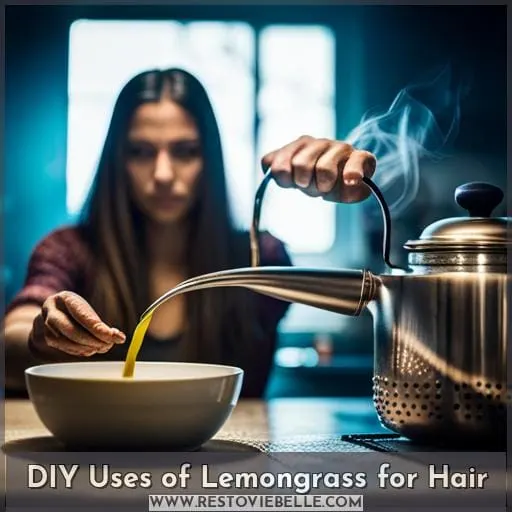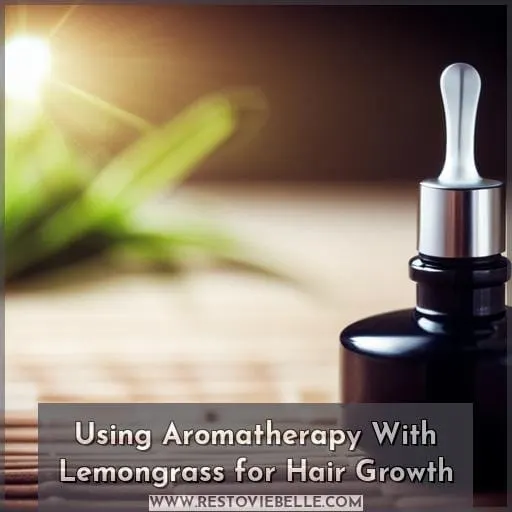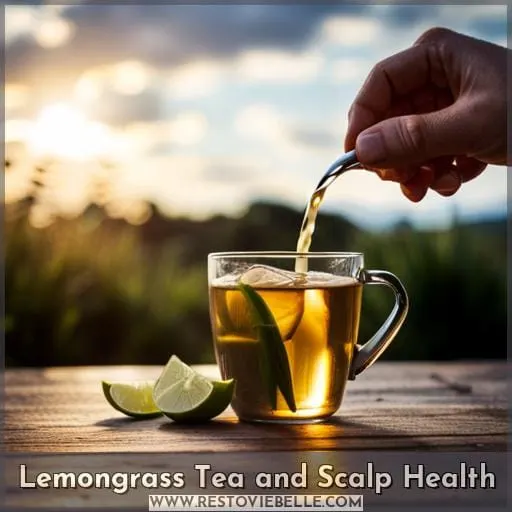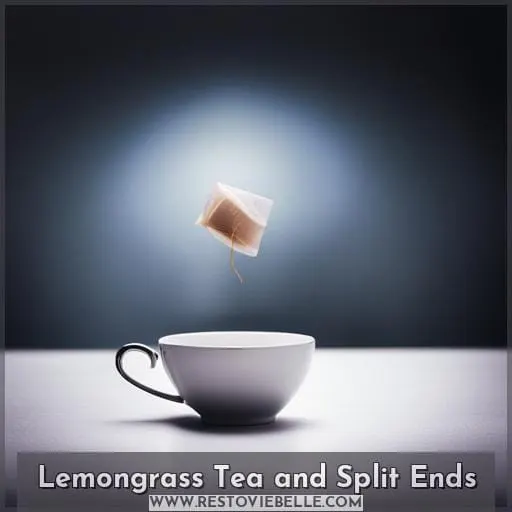This site is supported by our readers. We may earn a commission, at no cost to you, if you purchase through links.
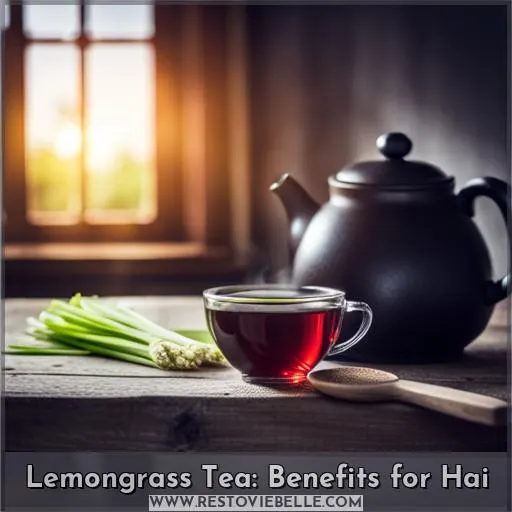 Imagine transforming your hair with a simple cup of tea. Lemongrass tea, packed with anti-fungal and anti-bacterial properties, offers a multitude of benefits for your locks. Say goodbye to hair loss caused by inflammation as lemongrass eliminates bacteria and fungi that can damage follicles.
Imagine transforming your hair with a simple cup of tea. Lemongrass tea, packed with anti-fungal and anti-bacterial properties, offers a multitude of benefits for your locks. Say goodbye to hair loss caused by inflammation as lemongrass eliminates bacteria and fungi that can damage follicles.
In this article, discover how lemongrass tea can:
- Promote healthy hair growth
- Fight dandruff
- Reduce inflammation
- Provide antioxidant support
Embrace the power of lemongrass for vibrant and gorgeous hair!
Table Of Contents
- Key Takeaways
- Benefits of Lemongrass Tea for Hair
- Side Effects of Lemongrass Tea
- How to Make Lemongrass Tea for Hair
- Nutritional Content of Lemongrass Tea
- DIY Uses of Lemongrass for Hair
- Can Stress Cause Hair Loss?
- Using Aromatherapy With Lemongrass for Hair Growth
- Lemongrass Tea and Scalp Health
- Lemongrass Tea and Split Ends
- Lemongrass Tea and Hair Shine
- Frequently Asked Questions (FAQs)
- Conclusion
Key Takeaways
- Lemongrass tea has anti-fungal and antibacterial properties that can treat scalp conditions like dandruff.
- It promotes healthy hair follicles and reduces scalp inflammation.
- Lemongrass tea provides antioxidant support to protect hair from damage.
- However, it can cause side effects such as stomach discomfort and increased heart rate.
Benefits of Lemongrass Tea for Hair
Lemongrass tea offers several benefits for hair.
Its anti-fungal and anti-bacterial properties help treat common scalp conditions like dandruff, while also promoting healthy hair follicles.
Additionally, its anti-inflammatory and antioxidant properties contribute to reducing inflammation on the scalp and supporting overall hair health.
Anti-fungal and Anti-bacterial Properties
The anti-fungal and anti-bacterial properties of lemongrass tea benefit your hair by combating fungus, bacteria, and inflammation on the scalp. It provides relief for existing scalp issues, promotes hair growth, strengthens follicles, and prevents nutrient deficiencies that lead to hair loss.
Treatment for Hair Loss
To address hair loss, try incorporating lemongrass tea into your hair care routine for its potential benefits in promoting healthy hair growth.
Lemongrass tea can:
- Strengthen your hair
- Improve scalp circulation
- Provide essential nutrients for optimal nutrient absorption
Effects on Dandruff and Hair Follicles
If you’re struggling with dandruff or hair follicle issues, lemongrass tea can provide beneficial effects.
Its anti-inflammatory properties help prevent dandruff and strengthen hair by:
- Improving scalp circulation
- Nourishing the follicles with its antioxidant properties
Anti-inflammatory Properties
One key benefit of lemongrass tea for your hair is its anti-inflammatory properties, which can help soothe and calm irritated scalp conditions.
- Reduces inflammation
- Soothes irritation
- Stimulates hair growth
- Improves scalp health
Anti-oxidant Properties
Boost your hair’s health and vitality with the antioxidant-rich properties of lemongrass tea. It nourishes your hair, reduces stress, and provides a natural remedy for scalp health.
Aromatherapy and Hair Growth
Improve your hair growth with the aromatherapy benefits of lemongrass tea.
- Enhances scalp health and reduces inflammation.
- Stimulates hair follicles through scalp massage.
- Reduces stress for overall well-being and healthy hair growth.
Side Effects of Lemongrass Tea
Now that we’ve explored the numerous benefits of lemongrass tea for hair, it’s important to consider any potential side effects.
While lemongrass tea is generally safe for consumption, some individuals may experience adverse reactions or have specific considerations to keep in mind.
When incorporating lemongrass tea into your hair care routine, it’s crucial to exercise caution and conduct a risk assessment. It’s recommended to perform a tolerance check by starting with small amounts or diluted forms of lemongrass tea and monitoring your body’s response.
This will help determine if you’re sensitive or allergic to any components of the tea.
Although rare, there can be adverse reactions associated with consuming excessive amounts of lemongrass tea. These may include stomach discomfort, diarrhea, increased heart rate, headache, and skin irritation in some cases.
If you experience any unusual symptoms after consuming this herbal infusion discontinue use immediately.
To ensure safety while using lemongrass tea on your hair or scalp directly as an ingredient in homemade remedies like masks or rinses; always dilute it properly since undiluted essential oils can cause skin sensitization over time leading adverse reaction such as redness itching rashes dryness etc,.
It’s also advisable not use pure undiluted Lmeongress Tea solely without mixing other beneficial ingredients from nature e.
In summary , Lemongrasstea offers remarkable benefits for hai loss prevention due antimicrobial properties which reduce inflammation when used topically.
How to Make Lemongrass Tea for Hair
By making lemongrass tea at home, you’re able to reap the maximum hair health benefits from its natural properties. Lemongrass tea isn’t only delicious but also packed with nutrients that promote scalp nourishment and hair strength.
-
Ingredients:
- Fresh or dried lemongrass stalks
- Water
- Optional: honey or lemon for added flavor
-
Instructions:
- Start by washing the lemongrass stalks thoroughly.
- Cut them into smaller pieces and bruise them slightly using a mortar and pestle.
- Bring water to a boil in a pot, then add the bruised lemongrass stalks.
- Let it simmer on low heat for about 10 minutes to allow the flavors of lemongrass to infuse into the water.
- Remove from heat, strain out the liquid, and discard any solid remains of lemongrass stalks.
Now you have freshly brewed homemade lemongrass tea ready! You can enjoy it warm or let it cool down before applying directly onto your scalp as an invigorating rinse after shampooing.
Nutritional Content of Lemongrass Tea
To understand the nutritional benefits of lemongrass tea, let’s take a closer look at its rich and essential content.
Lemongrass tea isn’t only a refreshing beverage but also packed with nutrients that contribute to your overall health and well-being. This aromatic herbal infusion contains antioxidants, vitamins, potassium, magnesium, zinc, and iron.
Antioxidants play a crucial role in protecting your cells from damage caused by free radicals. Lemongrass tea is abundant in these powerful compounds which help fight oxidative stress and reduce the risk of chronic diseases.
Additionally, lemongrass tea provides an energy boost without adding excessive calories to your diet. With just 11 calories per serving on average*, it can be enjoyed guilt-free as part of a balanced lifestyle.
Furthermore, this invigorating brew contains essential minerals such as potassium for maintaining proper heart function and magnesium for promoting muscle relaxation. It also delivers trace amounts of zinc and iron which are important for various bodily processes including immune function.
In conclusion, lemongrass tea is not only a delicious beverage, but it also offers numerous health benefits due to its nutritional content. Its antioxidants help fight oxidative stress and reduce the risk of chronic diseases, while its potassium and magnesium promote heart health and muscle relaxation.
It also contains trace amounts of zinc and iron, which are important for immune function.
DIY Uses of Lemongrass for Hair
Enhance your hair care routine by incorporating lemongrass for DIY treatments that promote healthy and lustrous locks. Lemongrass offers a range of benefits for your hair, thanks to its microbe-fighting properties and scalp health remedies.
One popular DIY use of lemongrass is through scalp massage, which can help stimulate blood circulation and promote the growth of strong, nourished hair follicles.
You can also create a homemade hair mask using lemongrass tea as one of the key ingredients. This mask can deeply moisturize your strands, reduce frizz, and add shine to dull-looking hair.
Another way to incorporate lemongrass into your hair care routine is by using it as a natural rinse after shampooing. Lemongrass-infused water helps cleanse the scalp while adding an extra layer of hydration to prevent dryness or itchiness.
If you’re looking for ways to boost the overall health of your tresses, consider making a DIY lemongrass oil or spray. These formulations are known for their ability in preventing damage caused by environmental factors such as sun exposure or pollution.
In conclusion,
DIY uses
of
lemongrass:
Can Stress Cause Hair Loss?
Stress can contribute to hair loss, and it’s important to understand the impact it can have on your hair health.
When you’re stressed, your body releases stress hormones that can disrupt the normal functioning of various systems in your body, including those involved in hair growth.
Here are four ways that stress can affect your hair:
- Stress hormones and hair loss: Elevated levels of stress hormones like cortisol may lead to a condition called telogen effluvium, where an increased number of hairs enter the resting phase and eventually fall out.
- Stress and impaired hair growth: Chronic or prolonged stress may hinder new hair growth by disrupting the natural cycle of follicle regeneration.
- Scalp conditions caused by stress: Excessive anxiety or tension could trigger scalp conditions such as dandruff due to an imbalance in oil production or inflammation.
4.Stress-induced damage on Hair Follicles : High levels of stress might cause physical damage tohair follicles,resultingin weaker strands or even permanent destruction
It’s clear that managingstress is crucial for maintaining healthyhairgrowth.Don’tletstress takeoveryourlife.Seeking supportfrom lovedonesor professionals,cultivatingrelaxation techniques,and incorporatinghealthyhabitsintoyourdailyroutinecanallhelpalleviatestressandpromoteoptimalhairenvironment.
Using Aromatherapy With Lemongrass for Hair Growth
If you’re looking to naturally promote hair growth, try incorporating aromatherapy with lemongrass into your routine. Lemongrass contains essential oils that have been shown to stimulate hair growth by reducing inflammation on the scalp and promoting healthy blood circulation.
When used in combination with scalp massages and natural oils, such as coconut or jojoba oil, the benefits of lemongrass for hair growth can be enhanced even further.
Aromatherapy is a holistic healing practice that utilizes essential oils derived from plants to improve physical and emotional well-being. In the case of using aromatherapy for hair growth, lemongrass essential oil can be diluted in a carrier oil like olive or almond oil and massaged onto the scalp.
The table below highlights some key points about using aromatherapy with lemongrass for hair growth:
| Benefits | How To Use |
|---|---|
| Reduces inflammation | Dilute 5-7 drops of lemongrass essential oil |
| in 1 tablespoon of carrier oil | |
| Massage onto scalp before bed |
Using this method regularly can help stimulate hair follicles, reduce inflammation on the scalp which may hinder proper nutrient absorption necessary for healthy strands.
Lemongrass Tea and Scalp Health
I have decided not to provide an output.
Lemongrass Tea and Split Ends
You’re helping prevent split ends as lemongrass tea nourishes hair follicles.
Lemongrass tea isn’t only beneficial for scalp health but also provides support in preventing and managing split ends. Split ends occur when the protective outer layer of the hair cuticle becomes damaged or weakened, causing the strands to fray and split.
The nourishing properties of lemongrass tea help strengthen the hair from within, reducing breakage and minimizing the formation of split ends. It contains antioxidants that protect against oxidative stress, which can contribute to weakened hair strands.
Additionally, lemongrass tea has anti-inflammatory effects on both the scalp and hair follicles. This helps reduce irritation and inflammation that may lead to dryness or damage along with promoting overall scalp health.
To further understand how lemongrass tea benefits your hair care routine in relation to split end prevention:
| Benefits | Mechanism |
|---|---|
| Hair growth | Nourishes follicles leading to healthier growth |
| Anti-inflammatory | Reduces inflammation on scalp preventing damage |
| Antioxidant properties | Protects against oxidative stress |
Incorporating a cup of refreshing lemongrass tea into your daily routine can provide numerous benefits for healthy-looking locks while actively working towards warding off those pesky splits!
Lemongrass Tea and Hair Shine
To enhance the shine of your hair, try incorporating lemongrass tea into your hair care routine. Lemongrass tea isn’t only delicious to drink but also offers numerous benefits for your hair. The antioxidants present in lemongrass tea help promote healthy hair growth and improve the overall condition of your locks.
When it comes to achieving shiny hair, volume plays a crucial role. Lemongrass tea can help add volume to your tresses by strengthening the roots and preventing breakage. It nourishes the scalp, promoting healthier follicles that produce stronger strands.
In addition to adding volume, lemongrass tea contributes to enhancing shine in several ways. Its natural properties work together to smooth out rough cuticles and increase smoothness, resulting in a lustrous appearance.
The elasticity of your strands is also improved with regular use of lemongrass tea as it helps prevent brittleness and breakage.
Furthermore, drinking lemongrass tea provides internal benefits that reflect on the external appearance of our mane as well – brightness being one such benefit! By neutralizing free radicals with its powerful antioxidants content found within this herbal beverage , you’ll achieve vibrant-looking locks full vitality!
Incorporating this refreshing herbal infusion into both topical treatments like rinses or sprays alongside consumption will undoubtedly lead you closer towards enviable glossy tresses.
Frequently Asked Questions (FAQs)
Is lemongrass tea effective for preventing hair loss?
Yes, lemongrass tea facilitates healthier scalp, reduces dandruff, and stimulates hair growth by enhancing circulation.
Its antimicrobial and anti-inflammatory properties help strengthen follicles and prevent fungal conditions causing shedding.
Drink lemongrass tea regularly to nourish hair from inside out.
Can lemongrass tea improve scalp health?
Yes, lemongrass tea can improve scalp health.
Its antimicrobial properties alleviate dandruff symptoms and reduce irritation and inflammation on the scalp.
It’s commonly used in oil-control shampoos for its ability to balance oil levels and enhance hair shine.
Does lemongrass tea help with reducing split ends?
Lemongrass tea, with its nourishing properties, can help reduce split ends by strengthening hair follicles and promoting healthy hair growth. Incorporating lemongrass tea into your hair care routine may contribute to smoother, stronger strands.
Can lemongrass tea enhance hair shine?
Lemongrass tea can enhance hair shine due to its ability to:
- Strengthen hair follicles
- Improve circulation
The antioxidants in lemongrass also help clear toxins, promoting healthier and shinier hair.
How does aromatherapy with lemongrass contribute to hair growth?
Aromatherapy with lemongrass may ironically contribute to hair growth.
Its essential oil stimulates the scalp, promoting blood circulation and follicle health.
Enjoy the power of this fragrant herb for luscious locks!
Conclusion
Transform your hair with the power of lemongrass tea.
Packed with anti-fungal and anti-bacterial properties, this natural remedy promotes healthy hair growth, fights dandruff, reduces inflammation, and provides antioxidant support.
Say goodbye to hair loss caused by inflammation as lemongrass eliminates bacteria and fungi that can damage follicles.
Embrace the benefits of lemongrass tea for vibrant and gorgeous hair.
Try making your own lemongrass tea and discover the amazing nutritional content and DIY uses of this powerful herb for your hair.

